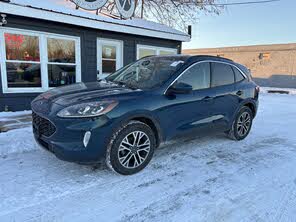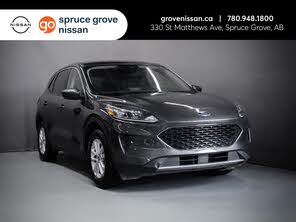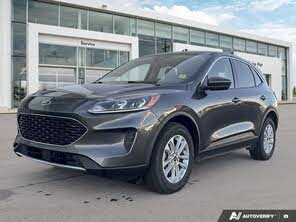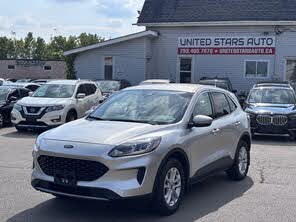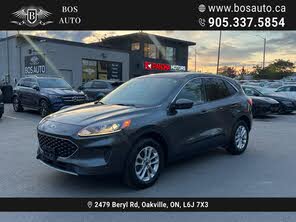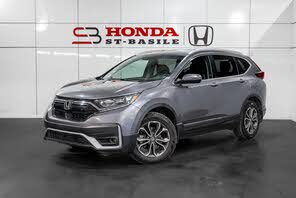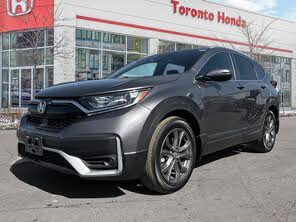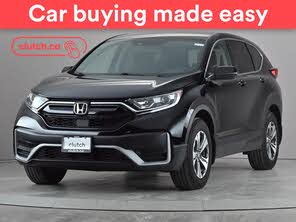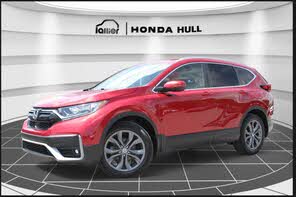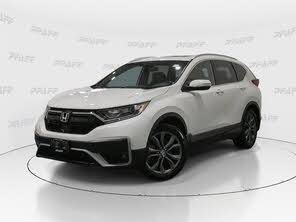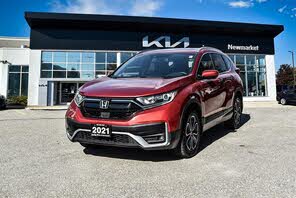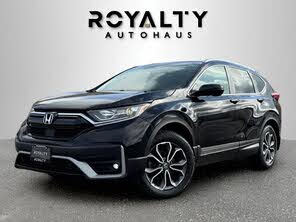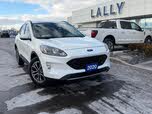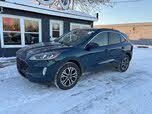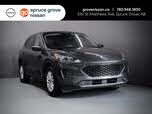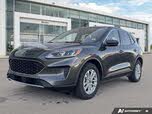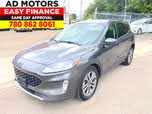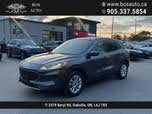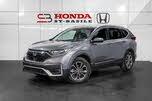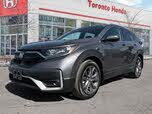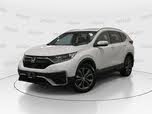2020 Ford Escape vs 2021 Honda CR-V
Overview | |
MSRP$24,885 | MSRP$25,350 |
Listings306 | Listings408 |
Ratings & Reviews | |
User Reviews | User Reviews |
Expert reviews8.0 out of 10 | Expert reviews7.8 out of 10 |
Pros
Cons
| |
2020 Ford Escape Reviews SummaryIn case you didn’t hear, Ford came out with an electric crossover, calling it the Mustang Mach-E. Ford could have called it something else, but the marketing department decided to leverage the famous Mustang name to capture headlines and, hopefully, shoppers. What should not be overlooked is the fact Ford chose to make its first-ever standalone electric vehicle a crossover. This choice is a testament to how far the sport utility vehicle has come. Paired with Ford's decision to phase out sedans and hatchbacks, it's clear the company is putting all of its eggs into its trucks, SUVs, and crossovers. Suffice it to say, there is just a bit of pressure on the redesigned 2020 Ford Escape. While the Escape has been around since 2000, it came into its own in 2013 when the “One Ford” philosophy was adopted, meaning that vehicles would be sold in multiple markets around the globe. As a result, the U.S. got Europe’s Ford Kuga, rebranded as the Escape—a high-tech, handsome, and surprisingly athletic small SUV. So, with all this mind, the new Escape needs to not only be an improvement over the previous generation to compete against the rest of the compact crossover segment, it also needs to win over would-be sedan and hatchback customers. Can the 2020 Escape rise to the occasion? | |
2021 Honda CR-V Reviews SummaryEven in a grim year, Honda is selling a staggering number of CR-Vs. The CR-V is the best-selling Honda in Canada, edging out the home-built Honda Civic. The CR-V is also the second best-selling compact SUV, just behind the Toyota RAV4. And it was the sixth best-selling vehicle in Canada in 2021. So, it’s hard to argue against the CR-V formula. Honda’s been at this almost as long as crossovers have been a thing, launching the CR-V in 1997—a year after the RAV4 debuted. The funny thing is, aside from sales volume, there’s only one thing the CR-V particularly excels at. Aesthetics are subjective, but it would be hard to argue the CR-V is the best-looking vehicle in its class. It’s not the cheapest. It’s not the best equipped, especially at the middle to lower trim levels. It’s not the fastest, nor is it the quietest, or the most fuel efficient. It’s not even the most reliable, showing up nowhere in J.D. Power's Most Reliable list. So, what makes it so appealing to Canadian consumers? Let’s see if we can figure that out. | |
No video found | No video found |
Popular Features & Specs | |
Engine1.5L 181 hp I3 | Engine1.5L 190 hp I4 |
Drive TrainFWD | Drive TrainFWD |
Seating Capacity5 | Seating Capacity5 |
Horsepower | Horsepower190 hp @ 5600 rpm |
MPG City27 | MPG City28 |
MPG Highway33 | MPG Highway34 |
Engine | |
Engine Name1.5L 181 hp I3 | Engine Name1.5L 190 hp I4 |
Torque | Torque179 lb-ft @ 2000 rpm |
Horsepower | Horsepower190 hp @ 5600 rpm |
DrivetrainFWD | DrivetrainFWD |
Fuel Economy | |
MPG City27 | MPG City28 |
MPG Highway33 | MPG Highway34 |
Interior | |
Seating Capacity5 | Seating Capacity5 |
Safety | |
Front Crash Overall5 | Front Crash Overall5 |
Side Crash Overall5 | Side Crash Overall5 |
Dimensions & Capacity | |
Cargo Space37.5 cu ft | Cargo Space39.2 cu ft |
Curb Weight3299 lbs | Curb Weight3337 lbs |
Height66.1 in | Height66.1 in |
Length180.5 in | Length182.1 in |
Width85.6 in | Width73.0 in |
Wheelbase106.7 in | Wheelbase104.8 in |
Maximum Payload | Maximum Payload1358 lbs |
Number of doors4 | Number of doors4 |
Maximum Towing Capacity | Maximum Towing Capacity1500 lbs |
Overview | ||
MSRP | $24,885 | $25,350 |
Listings | ||
Ratings & Reviews | ||
User reviews | ||
Expert reviews | 8.0 out of 10Read full review | 7.8 out of 10Read full review |
Pros & cons | Pros
Cons
| |
Summary | In case you didn’t hear, Ford came out with an electric crossover, calling it the Mustang Mach-E. Ford could have called it something else, but the marketing department decided to leverage the famous Mustang name to capture headlines and, hopefully, shoppers. What should not be overlooked is the fact Ford chose to make its first-ever standalone electric vehicle a crossover. This choice is a testament to how far the sport utility vehicle has come. Paired with Ford's decision to phase out sedans and hatchbacks, it's clear the company is putting all of its eggs into its trucks, SUVs, and crossovers. Suffice it to say, there is just a bit of pressure on the redesigned 2020 Ford Escape. While the Escape has been around since 2000, it came into its own in 2013 when the “One Ford” philosophy was adopted, meaning that vehicles would be sold in multiple markets around the globe. As a result, the U.S. got Europe’s Ford Kuga, rebranded as the Escape—a high-tech, handsome, and surprisingly athletic small SUV. So, with all this mind, the new Escape needs to not only be an improvement over the previous generation to compete against the rest of the compact crossover segment, it also needs to win over would-be sedan and hatchback customers. Can the 2020 Escape rise to the occasion? | Even in a grim year, Honda is selling a staggering number of CR-Vs. The CR-V is the best-selling Honda in Canada, edging out the home-built Honda Civic. The CR-V is also the second best-selling compact SUV, just behind the Toyota RAV4. And it was the sixth best-selling vehicle in Canada in 2021. So, it’s hard to argue against the CR-V formula. Honda’s been at this almost as long as crossovers have been a thing, launching the CR-V in 1997—a year after the RAV4 debuted. The funny thing is, aside from sales volume, there’s only one thing the CR-V particularly excels at. Aesthetics are subjective, but it would be hard to argue the CR-V is the best-looking vehicle in its class. It’s not the cheapest. It’s not the best equipped, especially at the middle to lower trim levels. It’s not the fastest, nor is it the quietest, or the most fuel efficient. It’s not even the most reliable, showing up nowhere in J.D. Power's Most Reliable list. So, what makes it so appealing to Canadian consumers? Let’s see if we can figure that out. |
Video | No video found | No video found |
Popular Features & Specs | ||
Engine | 1.5L 181 hp I3 | 1.5L 190 hp I4 |
Drive Train | FWD | FWD |
Seating Capacity | 5 | 5 |
Horsepower | 190 hp @ 5600 rpm | |
MPG City | 27 | 28 |
MPG Highway | 33 | 34 |
Engine | ||
Engine Name | 1.5L 181 hp I3 | 1.5L 190 hp I4 |
Torque | 179 lb-ft @ 2000 rpm | |
Horsepower | 190 hp @ 5600 rpm | |
Drivetrain | FWD | FWD |
Fuel Economy | ||
MPG City | 27 | 28 |
MPG Highway | 33 | 34 |
Interior | ||
Seating Capacity | 5 | 5 |
Safety | ||
Front Crash Overall | 5 | 5 |
Side Crash Overall | 5 | 5 |
Dimensions & Capacity | ||
Cargo Space | 37.5 cu ft | 39.2 cu ft |
Curb Weight | 3299 lbs | 3337 lbs |
Height | 66.1 in | 66.1 in |
Length | 180.5 in | 182.1 in |
Width | 85.6 in | 73.0 in |
Wheelbase | 106.7 in | 104.8 in |
Maximum Payload | 1358 lbs | |
Number of doors | 4 | 4 |
Maximum Towing Capacity | 1500 lbs | |
The 2020 Ford Escape presented itself as an attractive compact crossover, borrowing design elements from the Ford GT supercar, such as its large grille and inspired headlights. Its curvaceous design marked a departure from the more upright rear end of its predecessor, which came at the cost of some cargo space. Despite this, the Escape remained one of the best-looking small SUVs, trailing only behind the Mazda CX-5 and Jeep Cherokee. Inside, the Escape boasted a modern cabin with a digital instrument panel and a floating infotainment screen, maintaining a balance between futuristic design and practical control placement.
In contrast, the 2021 Honda CR-V's exterior styling was more conventional, blending in with other compact crossovers. While it featured a few distinguishing details like its grille and chromed plastic accents, the CR-V was not a vehicle purchased for its looks. It offered a limited colour palette, with most options being shades of grey, black, or white. Inside, the CR-V provided a modern look with angular seat designs and upscale touches like wood panels and chrome, especially in higher trims. However, it faced stiff competition from rivals like the Kia Sportage and Hyundai Tucson, which offered more distinctive styling.

















The 2020 Ford Escape stood out with its diverse engine lineup, offering four options, including a new three-cylinder engine producing 180 horsepower and 177 pound-feet of torque. This engine was standard in the S, SE, and SEL trims. The 2.0-litre turbocharged four-cylinder engine, available on the SEL and standard on the Titanium, delivered 250 horsepower and 275 pound-feet of torque, providing brisk acceleration. The Escape also offered hybrid and plug-in hybrid options, with the hybrid producing 198 horsepower. The conventional engines used an 8-speed automatic transmission, while the hybrids employed a CVT. The Escape's steering was direct and taut, offering an athletic feel, and its brakes were strong and responsive. The hybrid version was the most fuel-efficient, with consumption figures of 5.4 litres per 100 kilometres in the city and 6.3 on the highway with FWD.
The 2021 Honda CR-V, on the other hand, offered a single powertrain across all trims: a 1.5-litre turbo four-cylinder engine with 190 horsepower. It achieved 0 to 100 kilometres per hour in about 8 seconds, which was competitive within its class. The CR-V's CVT maintained the engine's revs at a constant level, providing smooth acceleration but lacking engagement. The CR-V came standard with FWD, with AWD as an option on the LX and standard on other trims. Its suspension setup was typical for the class, with a MacPherson strut front and multi-link rear, offering decent handling and ride quality.
The 2020 Ford Escape's sleek design resulted in reduced cargo space compared to its predecessor, offering 974 litres behind the second row and up to 1,852 litres with the seats folded. This was less than competitors like the Honda CR-V, Subaru Forester, and Volkswagen Tiguan, which offered around 2,100 litres. However, the Escape prioritized passenger space, providing ample headroom and legroom for second-row passengers and a commanding seating position for the driver. It also featured numerous storage solutions, including deep water-bottle holders and multiple compartments.
The 2021 Honda CR-V excelled in interior space, offering more than 100 litres more volume than the Toyota RAV4. It provided 1,065 litres of cargo space with the rear seats folded, accommodating plenty of luggage. Access to the cargo area varied by trim, with the LX featuring a manual tailgate, the Sport offering a power tailgate, and the Touring including a hands-free version. Most CR-V trims came with standard roof rails, enhancing its practicality for carrying additional gear.
The 2020 Ford Escape's base trim featured a small 4.2-inch audio control screen, while the SE trim upgraded to an 8-inch Sync touchscreen with Android Auto and Apple CarPlay. The Titanium trim included a head-up display, although its flip-up screen design limited its effectiveness for taller drivers. The latest Sync version allowed for multitasking, enhancing the user experience.
In contrast, the 2021 Honda CR-V came standard with a 7-inch high-definition touchscreen infotainment system, offering Bluetooth, Apple CarPlay, and Android Auto connectivity. Lower trims had varying audio setups, while the Touring trim featured a 300-watt system with a subwoofer. The CR-V also included multiple charging ports throughout the cabin, with the Touring trim adding a wireless phone charger.
The 2020 Ford Escape came equipped with a comprehensive array of safety features, including front- and side-impact airbags, a reversing camera, traction control, and TPMS. It earned a "Good" rating from the IIHS in all phases of testing. The Escape also featured Ford Co-Pilot360, a suite of advanced safety systems, including forward-collision warning, automatic emergency braking, lane-keeping assist, blind-spot monitoring, and rear cross-traffic alert.
The 2021 Honda CR-V excelled in safety, earning a five-star NHTSA overall crash test rating and an IIHS Top Safety Pick award. It featured the Honda Sensing system, which included a multi-angle rearview camera, forward collision warning, lane departure warning, automatic emergency braking, road departure mitigation, lane keeping assist, adaptive cruise control, and auto high-beam headlamps. The only feature not standard on the base LX trim was blind spot monitoring with rear cross-traffic alert.
CarGurus highlights

According to CarGurus experts, the overall rating for the 2020 Ford Escape is 8.0 out of 10, while the 2021 Honda CR-V scores 7.8 out of 10. Based on these ratings, the 2020 Ford Escape is the recommended choice, offering a more engaging driving experience, a variety of powertrain options, and a modern interior design.
Choose the 2020 Ford Escape if:
- You value a wide range of engine options, including hybrid and plug-in hybrid variants.
- You prefer a sporty driving experience with direct steering and responsive brakes.
- You appreciate a modern cabin design with advanced infotainment features.
Choose the 2021 Honda CR-V if:
- You prioritize safety, with a comprehensive suite of standard advanced safety features.
- You need ample interior space and practical cargo solutions.
- You want a reliable and smooth driving experience with a single, efficient powertrain.
CarGurus highlights

According to CarGurus experts, the overall rating for the 2020 Ford Escape is 8.0 out of 10, while the 2021 Honda CR-V scores 7.8 out of 10. Based on these ratings, the 2020 Ford Escape is the recommended choice, offering a more engaging driving experience, a variety of powertrain options, and a modern interior design.
Choose the 2020 Ford Escape if:
Shop Now- You value a wide range of engine options, including hybrid and plug-in hybrid variants.
- You prefer a sporty driving experience with direct steering and responsive brakes.
- You appreciate a modern cabin design with advanced infotainment features.
Choose the 2021 Honda CR-V if:
Shop Now- You prioritize safety, with a comprehensive suite of standard advanced safety features.
- You need ample interior space and practical cargo solutions.
- You want a reliable and smooth driving experience with a single, efficient powertrain.

By: CarGurus + AI
At CarGurus, our team of experienced automotive writers remain at the heart of our content operation, conducting hands-on car tests and writing insightful guides that are backed by years of industry experience. To complement this, we are harnessing AI to make our content offering more diverse and more helpful to shoppers than ever. To achieve this, our AI systems are based exclusively on CarGurus content, ratings and data, so that what we produce is both unique to CarGurus, and uniquely helpful to car shoppers.



